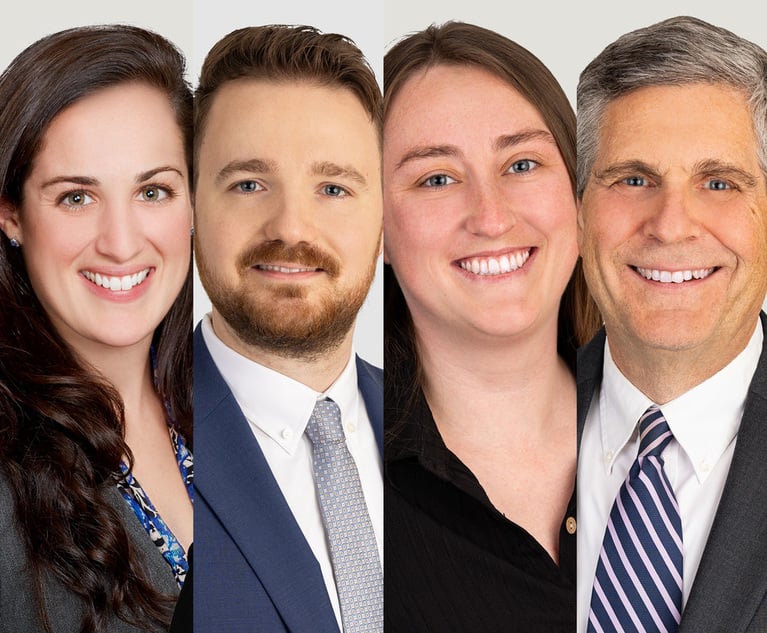 Sexual misconduct. Photo: Andrey_Popov/Shutterstock.com
Sexual misconduct. Photo: Andrey_Popov/Shutterstock.comWhat Attorneys Need to Know About New Sexual Harassment Law
A new state law that takes effect Oct. 1 requires all businesses with at least three people to provide sexual harassment training to employees. It imposes fines upward of $1,000 for noncompliance.
September 25, 2019 at 05:22 PM
3 minute read
In part due to the #MeToo Movement, Connecticut businesses of at least three people will now be required to provide sexual harassment training to all employees within the next year.
Connecticut's Public Act 19-16, also known as the Time's Up Act, takes effect Oct. 1, and has left attorneys making last-minute calls to employer-clients.
Previously, sexual harassment training was only for supervisors and only for businesses who employed at least 50 people.
But the new law might surprise some small-business owners, said attorney Bob Mitchell, a principal at Mitchell & Sheahan in Stratford.
"They will comply because they have no choice," said Mitchell, who represents small-business owners as part of his employment law practice. "But it will definitely be a burden for some of these small companies—not just in expense, but also time-wise and administratively. I think it will be a mild annoyance for some of them."
Noncompliance could result in fines upward of $1,000.
"If you ignore them and end up in court, that's not a good look for you," said Kelly Cardin, an Ogletree, Deakins, Nash, Smoak & Stewart associate who specializes in employment litigation and workplace investigations. "If it comes out in court that you have not complied with the law, jurors will not like that, and it could be a strike against [the business]."
In talking to her business clients, Cardin advises to ensure they have accurate training material by consulting with counsel and incorporating guidance and regulations from the Commission on Human Rights and Opportunities. For instance, the commission will soon make available a video on preventing workplace sexual harassment.
But first, attorneys need to make their clients aware of the new law that takes effect next week.
"Very few employers actually know about this," Mitchell said. "We are telling our clients, and I'm sure other attorneys are telling their clients. But there is no organized method that the state government has to inform anyone, and they probably should have had one."'
The new law doesn't cover independent contractors or part-time employees who work less than 20 hours a week.
Day Pitney's Dan Schwartz called it "only a starting point."
"Companies must have policies and training, but companies also have a responsibility to enforce its policies," said Schwartz, a partner in the firm's labor and employment department. He said the #MeToo movement played a role in the Nutmeg State adopting the new law.
The law will also have provisions related to statutes for sexual assault. It extends the statute of limitations from one year to 10 for misdemeanors, such as fourth-degree sexual assault. It also eliminates the statute of limitations for prosecuting sex assault against minors. And for civil cases, the age limit of a "minor" would change from 18 to 21 years old. As a result, victims younger than 21 years old will now have until their 51st birthday, as opposed to their 48th, to file civil lawsuits.
For Schwartz, the $1,000 civil penalty is a relatively small potential hurdle.
He said Wednesday, "The bigger risk is if they are sued for sexual harassment, and the jury considers their failure to be in compliance with the law, that can be a factor in potentially assessing punitive damages."
This content has been archived. It is available through our partners, LexisNexis® and Bloomberg Law.
To view this content, please continue to their sites.
Not a Lexis Subscriber?
Subscribe Now
Not a Bloomberg Law Subscriber?
Subscribe Now
NOT FOR REPRINT
© 2024 ALM Global, LLC, All Rights Reserved. Request academic re-use from www.copyright.com. All other uses, submit a request to [email protected]. For more information visit Asset & Logo Licensing.
You Might Like
View All
Managing Partner Vindicated in Disciplinary Proceeding Brought by Former Associate
5 minute read
Connecticut Movers: Year-End Promotions, Hires and an Office Opening
5 minute read
GC Pleads Guilty to Embezzling $7.4 Million From 3 Banks

Trending Stories
- 1Considering the Implications of the 2024 Presidential Election for Jurors in White Collar Cases
- 22024 in Review: Judges Met Out Punishments for Ex-Apple, FDIC, Moody's Legal Leaders
- 3What We Heard From Litigation Leaders in 2024
- 4Akin and Simpson Create New Practice Groups With Integrated Teams
- 5Thursday Newspaper
Who Got The Work
Michael G. Bongiorno, Andrew Scott Dulberg and Elizabeth E. Driscoll from Wilmer Cutler Pickering Hale and Dorr have stepped in to represent Symbotic Inc., an A.I.-enabled technology platform that focuses on increasing supply chain efficiency, and other defendants in a pending shareholder derivative lawsuit. The case, filed Oct. 2 in Massachusetts District Court by the Brown Law Firm on behalf of Stephen Austen, accuses certain officers and directors of misleading investors in regard to Symbotic's potential for margin growth by failing to disclose that the company was not equipped to timely deploy its systems or manage expenses through project delays. The case, assigned to U.S. District Judge Nathaniel M. Gorton, is 1:24-cv-12522, Austen v. Cohen et al.
Who Got The Work
Edmund Polubinski and Marie Killmond of Davis Polk & Wardwell have entered appearances for data platform software development company MongoDB and other defendants in a pending shareholder derivative lawsuit. The action, filed Oct. 7 in New York Southern District Court by the Brown Law Firm, accuses the company's directors and/or officers of falsely expressing confidence in the company’s restructuring of its sales incentive plan and downplaying the severity of decreases in its upfront commitments. The case is 1:24-cv-07594, Roy v. Ittycheria et al.
Who Got The Work
Amy O. Bruchs and Kurt F. Ellison of Michael Best & Friedrich have entered appearances for Epic Systems Corp. in a pending employment discrimination lawsuit. The suit was filed Sept. 7 in Wisconsin Western District Court by Levine Eisberner LLC and Siri & Glimstad on behalf of a project manager who claims that he was wrongfully terminated after applying for a religious exemption to the defendant's COVID-19 vaccine mandate. The case, assigned to U.S. Magistrate Judge Anita Marie Boor, is 3:24-cv-00630, Secker, Nathan v. Epic Systems Corporation.
Who Got The Work
David X. Sullivan, Thomas J. Finn and Gregory A. Hall from McCarter & English have entered appearances for Sunrun Installation Services in a pending civil rights lawsuit. The complaint was filed Sept. 4 in Connecticut District Court by attorney Robert M. Berke on behalf of former employee George Edward Steins, who was arrested and charged with employing an unregistered home improvement salesperson. The complaint alleges that had Sunrun informed the Connecticut Department of Consumer Protection that the plaintiff's employment had ended in 2017 and that he no longer held Sunrun's home improvement contractor license, he would not have been hit with charges, which were dismissed in May 2024. The case, assigned to U.S. District Judge Jeffrey A. Meyer, is 3:24-cv-01423, Steins v. Sunrun, Inc. et al.
Who Got The Work
Greenberg Traurig shareholder Joshua L. Raskin has entered an appearance for boohoo.com UK Ltd. in a pending patent infringement lawsuit. The suit, filed Sept. 3 in Texas Eastern District Court by Rozier Hardt McDonough on behalf of Alto Dynamics, asserts five patents related to an online shopping platform. The case, assigned to U.S. District Judge Rodney Gilstrap, is 2:24-cv-00719, Alto Dynamics, LLC v. boohoo.com UK Limited.
Featured Firms
Law Offices of Gary Martin Hays & Associates, P.C.
(470) 294-1674
Law Offices of Mark E. Salomone
(857) 444-6468
Smith & Hassler
(713) 739-1250










